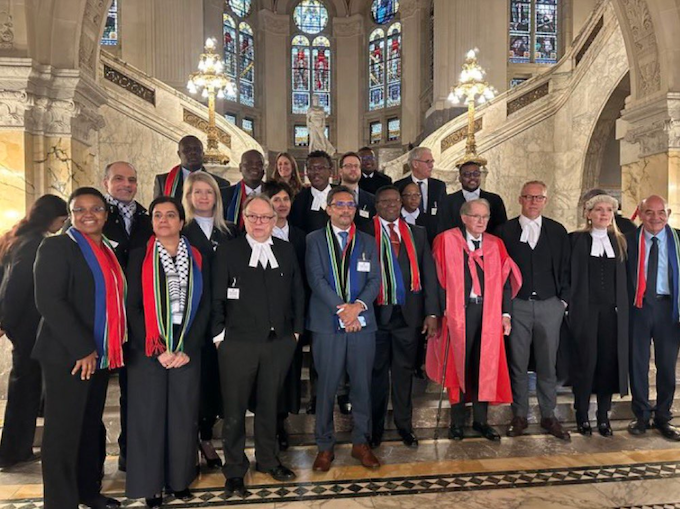
New Zealand’s commitment to the international rule of law means it must also go beyond the UN court’s genocide case findings on Gaza, writes the University of Auckland’s Treasa Dunworth.
ANALYSIS: By Treasa Dunworth
As Newsroom has reported, 15 aid agencies have joined forces to call on the Aotearoa New Zealand government to do more to encourage an immediate and sustainable ceasefire in Gaza, in the wake of the International Court of Justice (ICJ) decision.
Those 15 agencies are joining an international and increasingly loud chorus of calls for an immediate ceasefire.
I would go further, and remind the government that whatever it thinks of last month’s ICJ ruling, New Zealand has a number of international legal obligations to inform its response to Israel’s military attack on Gaza.
As most international commentary has highlighted, even fixated on, the ICJ did not order a ceasefire as South Africa requested. But the fact that it didn’t is a manifestation of how constrained the court was.
Despite its lofty title, the ICJ (sometimes referred to as the “World Court”) isn’t a “world” court in any meaningful sense of the word. It only has jurisdiction to consider issues in cases where countries have explicitly agreed to the court’s authority over them.
In this current litigation, the court was able to consider the case only on the basis that both South Africa and Israel are States Parties to the Genocide Convention. That meant South Africa had to frame its application through a “genocide lens”, and that the court had no power to go beyond the obligations arising out of that treaty. This jurisdictional conundrum partly explains why the court did not order a ceasefire — it didn’t have the authority to do so.
It also partly explains why the court could not order Hamas to release the remaining Israeli hostages. Hamas was not a party to the proceedings (the court can only hear proceedings on disputes between states), and despite the claim by Israel in its oral pleadings, the hostage taking by Hamas and their subsequent mistreatment and killing didn’t “plausibly”, according to the court, meet the threshold of genocide.
But the court did order Israel to take all measures in its power to prevent genocide, and ordered Israel to enable the provision of urgently needed basic services and humanitarian assistance to address the adverse conditions faced by Palestinians in Gaza.
Orders fall within ‘genocide jurisdiction’
These orders fall within the “genocide jurisdiction” because the treaty defines genocide as not only direct killing, but also “deliberately inflicting on the group conditions of life calculated to bring about its physical destruction in whole or in part”.
An immediate ceasefire would go a long way toward Israel complying with these orders so the calls for a ceasefire are well made, despite the court not having the power to order one.
What is New Zealand’s role in all this? What are the moral and legal responsibilities it has and should fulfil?
In its decision, the court (re)confirmed that all states parties to the Genocide Convention have a “common interest” in ensuring the prevention, suppression, and punishment of genocide. That includes New Zealand, which has a legal obligation to do what it can to ensure that Israel complies with the court’s orders.
This is not a question of New Zealand’s choice of foreign policy, but a legal obligation.
The second relevant international obligation for New Zealand arises from international humanitarian law (IHL) — the body of law which governs the conduct of war, and which includes prohibitions against the direct targeting of civilians, causing superfluous injury and unnecessary suffering, the taking of hostages, the use of “human shields” and engaging in indiscriminate attacks on civilians and civilian infrastructure.
These rules don’t just apply to the parties directly involved in any given conflict — in this instance, Israel and Hamas. The relevant treaties stipulate all states have a shared responsibility “to ensure respect” for these rules. That responsibility exists independently of the lack of ICJ jurisdiction to consider these matters.
Must act in good faith
There is a third legal obligation for New Zealand in the wake of these orders. Although decisions of the court are only binding as between the parties to a case (here South Africa and Israel), as a member of the United Nations, New Zealand has a legal obligation to act in good faith towards the court, being one of the organs of the UN and its principal legal body.
This obligation aligns with New Zealand’s self-professed commitment to the international rule of law.
Thus, regardless of political preferences and whether the current government agrees or disagrees with the court’s findings, the findings have been made and New Zealand ought not undermine the court or the international rule of law.
Governments of all political persuasions repeatedly pronounce that a small nation such as ours depends on the international rule of law and a rules-based international order.
Now is the time for New Zealand to step up and defend that order, even if it feels uncomfortable, even if it annoys some of our “friends” (such as the US). We are legally obliged to step up and speak out.
Dr Treasa Dunworth is an associate professor, Faculty of Law, at the University of Auckland. First published by Newsroom and republished by Asia Pacific Report with the author’s permission.












































